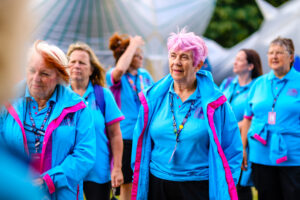Kate Bines looks to the future of community volunteering and its legacy after an energising Volunteers Week.

Volunteers Week 2023: how do we sustain volunteering long-term?

Yesterday saw the end of Volunteers Week 2023. A fantastic platform for organisations to thank their volunteers, celebrate their contribution and promote volunteering.
It’s wonderful to see timelines fill up stories of compassion, selflessness, generosity, people who go above and beyond and those who have life-changing experiences. But now it’s over for another year, what next?
This is the second year we’ve seen a cluster of major national and international events from the Coronation to Eurovision, and milestone anniversaries, from the Good Friday Agreement to Windrush. Each occasion is an opportunity to spark someone’s interest in volunteering, create lifelong volunteers, and a lasting social legacy from the event.
It’s something I’ve been thinking about a lot in the run up to this week, a week in which two volunteering projects, with their genesis in events, and at different stages in their life celebrate milestones. Hull City Council has been shortlisted for a Local Government Chronicle Community Involvement Award for the HEY! Volunteers, a six-year strong volunteering programme established in the city’s City of Culture Year and now expanded to cover East Yorkshire. Yesterday, United by 2022, the legacy charity of Birmingham’s Commonwealth Games launched their legacy volunteering programme.

Volunteering which is inspired by an event is different to volunteering for a cause or in a defined role in an established organisation, such as a Scout leader or school governor. One key difference is that events represent an opportunity to recruit large numbers of volunteers en masse with both The Big Help Out and Birmingham 2022 attracting huge numbers of volunteers (6.5 million and 14,000 respectively). But how do you sustain interest and engagement in event-based volunteering in the longer term?
The Power of Events Inquiry issued a clear ask on this: events that use volunteers must have a clear strategy to boost longer-term community volunteering. We all remember the pioneering Games Makers from London 2012 (you may have actually been one of the 70,000) and now volunteers are essential to being able to deliver major events, and a key pillar for community engagement. However successful the programme was in 2012, regrettably it didn’t leave us with a blueprint for post-event volunteering.
So what have we learned since? That working with existing local infrastructure, ongoing investment, accountability and strategic legacy planning are key ingredients. There needs to be careful thought given to how you retain the pride and shine of an association with event, but move on from the event itself to more mainstream “everyday” volunteering.
These are significant, but surmountable challenges for event organisers, funders and organising committees. Our research into event volunteering has surfaced other challenges for volunteering in its wider sense:
Who’s left out?
Volunteering is generally held to have a positive impact on the volunteer. A rapid review of evidence by What Works Centre for Wellbeing, however, showed that people who volunteer tend to be happier than people who don’t but they couldn’t rule out other factors – people who volunteer are happier, older and more financially secure in the first place. For some it’s not a good experience, and many, especially disabled people, face one or more barriers, or can’t access it at all. Crucially, the people who would benefit the most from the wellbeing impact of volunteering are also those who face the biggest barriers and that is something we urgently need to address.
Framing
Some people thrive on uniforms and reward schemes, being involved in a major campaign or event, a sense of being part of something. Others recoil from the word ‘volunteering’, for them, they simply help out. We’re working with Neighbourly Lab to look and people’s motivations and barriers to taking part and the relationship between informal/formal and micro-volunteering/regular volunteering.
Early findings from focus groups just before the Coronation found that people want to be part of something bigger, but they lead busy lives and they don’t want the commitment or formality of volunteering. Instead, they prefer to a pick and mix approach, helping out as and when needed. On 6 July Neighbourly Lab will be hosting a webinar to present their findings in full – sign up here.
We still have a lot to learn, but we’re starting to see what good looks like in terms of a long-term volunteering programme, and while it’s faced a few bumps on the journey, the longevity and sustained impact of Hull volunteers has been remarkable. They deserve to win at tonight’s LCG Awards, and I’ll have everything crossed for them!
